The impact of the Covid-19 pandemic in Luxembourg in 2021: Children aged 6-16 share their subjective well-being and experiences
The COVID-Kids II study, conducted by the University of Luxembourg in cooperation with UNICEF Luxembourg, shows that the prolonged impact of the pandemic has reduced life satisfaction for more than a third of children aged 6 to 16 in Luxembourg. Together, the two partners formulate recommendations for cultivating children’s resilience.
Successor to a pioneering study
For almost two years now, the Covid pandemic has dictated our lives. It has had an unprecedented impact on the lives of children. The COVID-Kids I project, carried out at the beginning of the pandemic in 2020 by the University of
Luxembourg in cooperation with UNICEF Luxembourg, revealed a decrease in the life satisfaction and emotional wellbeing of children aged 6 to 16 in Luxembourg. The first study also revealed that children’s well-being and the range of experiences varied according to their age, gender and socio-economic status, and that not all children had a positive experience with distance learning in spring 2020.
“The children’s voice has been largely absent during this pandemic despite the Convention on the Rights of the Child and although their participation and subjective well-being have been recognised as essential to achieving sustainable development”, says Dr. Claudine Kirsch, co-director of the COVID-Kids II.
“The COVID-Kids II project, conducted in 2021 provides a better understanding of the prolonged effect of the pandemic on children. It provides an overview of the subjective well-being of children and describes their leisure activities and learning experiences during the second year of the pandemic”, explains Dr. Claudine Kirsch, head of the studies presented here.
Key findings
The main findings can be summarised as follows:
- 31% of children (aged 6-11) and 43% of the older children (aged 12-16) indicated that their life satisfaction had decreased compared to before the pandemic.
- Satisfaction with the ways that adults listened is important for children’s well-being. However only half of the younger children and one third of the older children reported being satisfied or very satisfied with the way adults listen to them.
- The older children spent their time in a less ‘productive’ way than the younger children. Fewer of the older children attended clubs (e.g., sports, scouts) or classes (e.g., language, music) than the younger children.
- School absence rates were high: 43% of the younger children and 55% of the older missed more than 4 weeks of school.
- Children continued to experience learning at home (home-schooling). The majority of the younger children (55%) and almost all of the older children (96%) agreed that they learn more effectively at school than at home. When children worked at school, they found their work more understandable, interesting, and useful than when they had to work at home. The school performance of the older children has suffered during the pandemic: they reported doing less well at school.
- Parents supported the younger and older children in a variety of ways when they had to learn at home, notably providing access to materials and organising their schedules.
- Children’s emotional well-being during the pandemic is influenced by the difficulty, quantity, and the content of schoolwork during periods of isolation and quarantine, the reported levels of school satisfaction, and the satisfaction with the way adults listened to them.
- Older children and girls reported significantly more often negative feelings and worries than did younger children and boys.
“Many international studies confirm that children are affected differently by the pandemic and that differences in mental health or school performance are increasing between children”, says Claudine Kirsch.
“The children’s experiences during the pandemic highlight the importance of resilience. In the light of the rising Covid-19 cases fuelled by the Omicron variant, it is of critical importance that we build and cultivate the resilience of children”, said Isabelle Hauffels, UNICEF Luxembourg Advocacy Manager.
Recommendations
Based on the research findings of the project COVID-Kids II and UNICEF’s policy and programme guidance, the following elements should be taken into consideration:
- Whenever possible, keep schools open and have risk mitigation measures in place. Schools are places where children can socialise and learn, have meals, and get emotional and medical support.
- Help educational actors develop and implement social and emotional learning modules. These initiatives equip children with essential cognitive, behavioural, and emotional competencies. The amount of homework and the level of difficulty need to be appropriate and the content meaningful. Many children have learned less during the pandemic and may also have forgotten learning strategies and habits.
- Encourage the access to clubs, sports facilities, and extra-curricular activities and events, with social distancing measures in place, to counterbalance the trend towards more sedentary activities.
- Ensure that families receive adequate support: children are aware of their family members’ emotions and worries and are influenced by them. This, in turn, may trigger behavioural, cognitive, and emotional responses.
- Roll out parenting programmes to promote positive parenting at key developmental milestones for their child.
- Invest in structures that enable meaningful consultation with children. Their ideas, concerns, fears, hopes and solutions should be valued and heard.
—- END —-
Downloads
University of Luxembourg website >
Press folder >
Study >
Contact
University of Luxembourg
Dr Claudine Kirsch
Associate Professor
Faculty of Humanities, Education and Social Sciences
Tel.: 46 66 44 9802
Email: claudine.kirsch@uni.lu
UNICEF Luxembourg
Paul Heber
Chief Communication
Tel.: 448715-26
Email: pheber@unicef.lu


